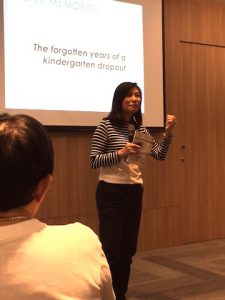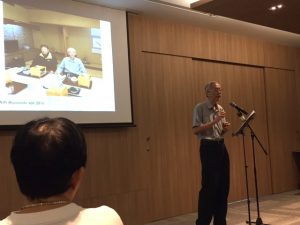Telling your life story
Participants wrote their stories from their past and some found the experience cathartic and a chance to pick up new skills.
BY: Eleanor Yap
A grandmother of one, Marjorie Wee wrote about her forgotten memories of her childhood, starting from when she enrolled into kindergarten and had to dropout because of her father’s sudden death. The 59-year-old described that period when she grew up as a “fly on the wall” in her maternal grandparents’ home; the death of her mother a few years later; and the extreme loneliness of being the only child in the company of uncaring adults, even though they were what were left of family for her. KK Lee, 64, chose to go down a much different path and wrote about three Japanese friends who he has known for over 30 years.
Marjorie and KK were participants of a recent programme by U 3rd Age (University of the Third Age) and The Arts House called Silver Writing, a programme different from the Guided Autobiography. Held from April to June with 10 sessions at The Arts House, mostly three hours long, the six participants covered a number of topics including “Who am I?” – a search to identify one’s self; storytelling with pictures; digital story writing; writing one’s childhood and family, aspirations and spiritual life, romance and love story, and chapter of my life; and reading my memoir.
There was also a bookbinding session; a talk with Josephine Chia, author of several local books including “My Mother-in-Law’s Son” and “Kampong Spirit: Gotong Royong, Life in Potong Pasir 1955 to 1965”, and a storytelling coaching session with Kamini Ramachandran, a professional storyteller. This is the third year the programme has run and this year, it culminated in four participants, including Marjorie and KK, sharing their stories at the Toa Payoh Public Library in front of an audience as part of the Silver Arts event organised yearly by the National Arts Council (NAC).
Shared Thomas Kuan, founder of U 3rd Age, of the benefits of writing one’s life story: “Writing one’s memoirs are good ways to reminisce the past in order to move forward with confidence and with more passion in life. It allows one to understand and discover oneself, and to give tributes and thanks to one’s mentors including ‘noble-persons’ and spouse who have helped and guided him or her in his or her journey in life.” He said that this year’s participants included one who has written a book about her family history before the start of programme, another who is an author of Chinese books, two who have written tributes to their beloved ones, and one who is in the process of writing her memoirs.
He added that the Silver Writing programme is useful is documenting seniors’ thoughts and feelings about their lives and work, aspirations and spiritual journeys from the early 20th century in Singapore. “Every senior has something to share with family, friends and communities; and this can be done by writing one’s life story,” said Thomas.
A chance to share & heal
For Marjorie, it was a chance to do some healing through the writing. “I am aware that I have lived a great part of my life with this ‘ghost’ from my past which has shadowed me, causing me to grieve in private and preventing me from being openly myself, especially amongst strangers. The ‘ghost’ came to life when my dad and later my mum died.
“I became an orphan, through no fault of mine, and I hated it. I cringe inwardly and wish I was dead, each time I encounter a condescending look of sympathy in another person’s eyes when they learn that I was an orphan – a ‘nobody’s child’. I hope by writing about it, I could exorcise this ‘ghost’ and be free to be myself, publicly and in private.”
She also picked up some writing skills from the programme. “I learnt that telling a story of one’s life need not follow a chronological order in terms of years as it can be laborious and boring for the reader to go through chunks of relatively uneventful details. It can start at a poignant period, using the mechanism of ‘flashbacks’. A lot depends on the author and the ‘inspiration’ to tell a story that others will be interested to read,” added the mother of three.
“I found writing about my erstwhile ‘forgotten’ past was cathartic. By writing about it and sharing it with others, it has helped me to achieve a closure of my past and move forward to live a life that is open and without skeletons in the closet.”
For KK, he joined the Silver Writing programme to improve his writing skills in English as when he growing up, he was educated in Mandarin. He added that the three friends he shared in his writing are “close to my heart”. Added the father of two: “I have been working with many foreign partners and those Japanese friends are the longest and dearest. There were so many stories to tell during my working life; I had to choose which ones were more meaningful.” He hopes to share his story with his family members and his Japanese friends.
KK added: “Everyone has many stories to tell. It is a matter of uncovering them and sharing it with others.”
According to The Arts House’s Lisa Lip, senior manager of programmes, they are planning to continue the writing programme but are currently in the process of reviewing the form which the programme should take and how else they can maximise the experience for the participants.
Some tips & tricks
Kamini, who is the founder of MoonShadow Stories, shared five tips for those who are keen to write their story:
- Reminisce – Start by making time to recall past memories and events.
- Journal – Write down these recollections in a diary chronologically. Add photos or other mementos related to the memory.
- Reconnect – Make an effort to meet up with friends and family so you can talk, discuss and ask questions related to what you want to write about.
- Write – Try to set aside time regularly (perhaps 15 minutes a day or one-hour a week) to write down your memories as a story. Feel free to revisit and edit as you feel necessary.
- Share – Form a small interest group of like-minded people who are also working on memoirs. Talk about your memories and show your work to receive some peer feedback.
| SIDEBOX: Silver Writing vs Guided Autobiography
Explained Thomas Kuan from U 3rd Age, “Silver Writing are written works done by seniors (in Singapore). It is creative and showcases writers’ interpretations of life with its failings and happiness. Guided Autobiography is more structured and guided. It is a technique for seniors to reminisce about their past personal lives.”
|



0 Comments